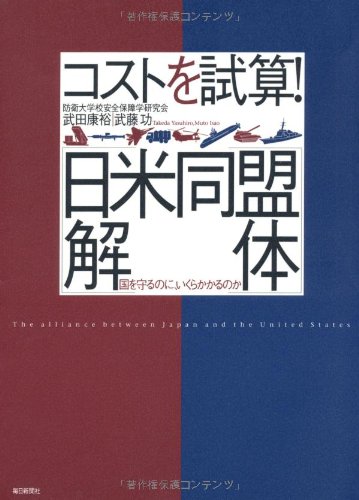82 0 0 0 コストを試算!「日米同盟解体」 : 国を守るのに、いくらかかるのか
- 著者
- 武田康裕 武藤功 防衛大学校安全保障学研究会著
- 出版者
- 毎日新聞社
- 巻号頁・発行日
- 2012
- 著者
- 武田 康裕
- 出版者
- 国際安全保障学会
- 雑誌
- 国際安全保障 (ISSN:13467573)
- 巻号頁・発行日
- vol.40, no.2, pp.150-154, 2012-09-30 (Released:2022-04-07)
1 0 0 0 OA 序論―経済と安全保障の相互作用
- 著者
- 武田 康裕
- 出版者
- 国際安全保障学会
- 雑誌
- 国際安全保障 (ISSN:13467573)
- 巻号頁・発行日
- vol.38, no.2, pp.1-10, 2010-09-30 (Released:2022-04-14)
1 0 0 0 OA 1978年「日米防衛協力のための指針」の策定過程 ―米国の意図と影響―
- 著者
- 松村 孝省 武田 康裕
- 出版者
- 国際安全保障学会
- 雑誌
- 国際安全保障 (ISSN:13467573)
- 巻号頁・発行日
- vol.31, no.4, pp.79-98, 2004-03-31 (Released:2022-04-24)
1 0 0 0 IR 政府専用機による在外邦人輸送をめぐる課題と対策
- 著者
- 武田 康裕
- 出版者
- JAPAN ASSOCIATION OF INTERNATIONAL RELATIONS
- 雑誌
- 国際政治 (ISSN:04542215)
- 巻号頁・発行日
- no.125, pp.162-179,L20, 2000
The purpose of this paper is twofold: to make a frame of reference for understanding the causal mechanisms that regime transitions tend to associate with external use of force, and to examine within this framework the military operations of China after reforms and opening-up.<br>Conflict initiation is a product of interaction between motivational factors in the state level and opportunity-related factors in the systemic level. In order to explore mutual relationship between the domestic dynamics and the international environment, this paper adopted the analytic approach of comparative politics and international politics combined. By focusing upon the political struggle within the ruling bloc, it approaches to the knotting points between the systemic level and the state level.<br>The key theoretical argument consists of two points: (1) The modality of divisions within the ruling bloc are motivational factors in determining whether the transitional regime succumbs to the temptation of a diversionary use of force; (2) The structural uncertainties of international system are opportunity-related factors which convert a potential for diversionary use of force into reality. Then the proposition is stated as follows: the probability of a transitional regime engaging in a hostile military action increases in two following conditions: (1) The ruling bloc is vertically divided between conservatives and reformers who are roughly equal in power; (2) The level of regional order is low in the multipolar system of relatively equal states.<br>China embarked on military operations in the Spratly Islands and Taiwan Straits in 1988, 1992, and 1995 while holding up <i>independent peace diplomacy</i> toward neighboring countries. Neither rational choice model nor organizational process model has successfully explained the reasons for a discrepancy between conflict behavior and cooperative diplomacy. While the former overestimates internal cohesion within the party leadership in the period of regime transition, the later underestimates party control over the military in the Leninist state. This paper concludes that Chinese military operations were diversionary actions for the state leaders to restore party unity.<br>In 1988 and 1992, Deng Xioping initiated naval operations over the Spratly Islands claimed by Vietnam to win the military's support, and then to beat off conservatives' challenge to the reform policy. In 1995, Jiang Zemin stood firm with the Philippines and Taiwan to let the military stay away from the intraparty struggle for leadership succession. The difference in subjectivity between two leaders was derived from changing nature of party-army relations associated with professionalism in the military. While Deng could maneuver potential rivalries between the professional officers and political commissars, Jiang had to be responsive to demands by the professional military. Both state leaders were risk-acceptant in that they recognized the structural uncertainties of regional system as an opportunity of provoking militarized actions.



